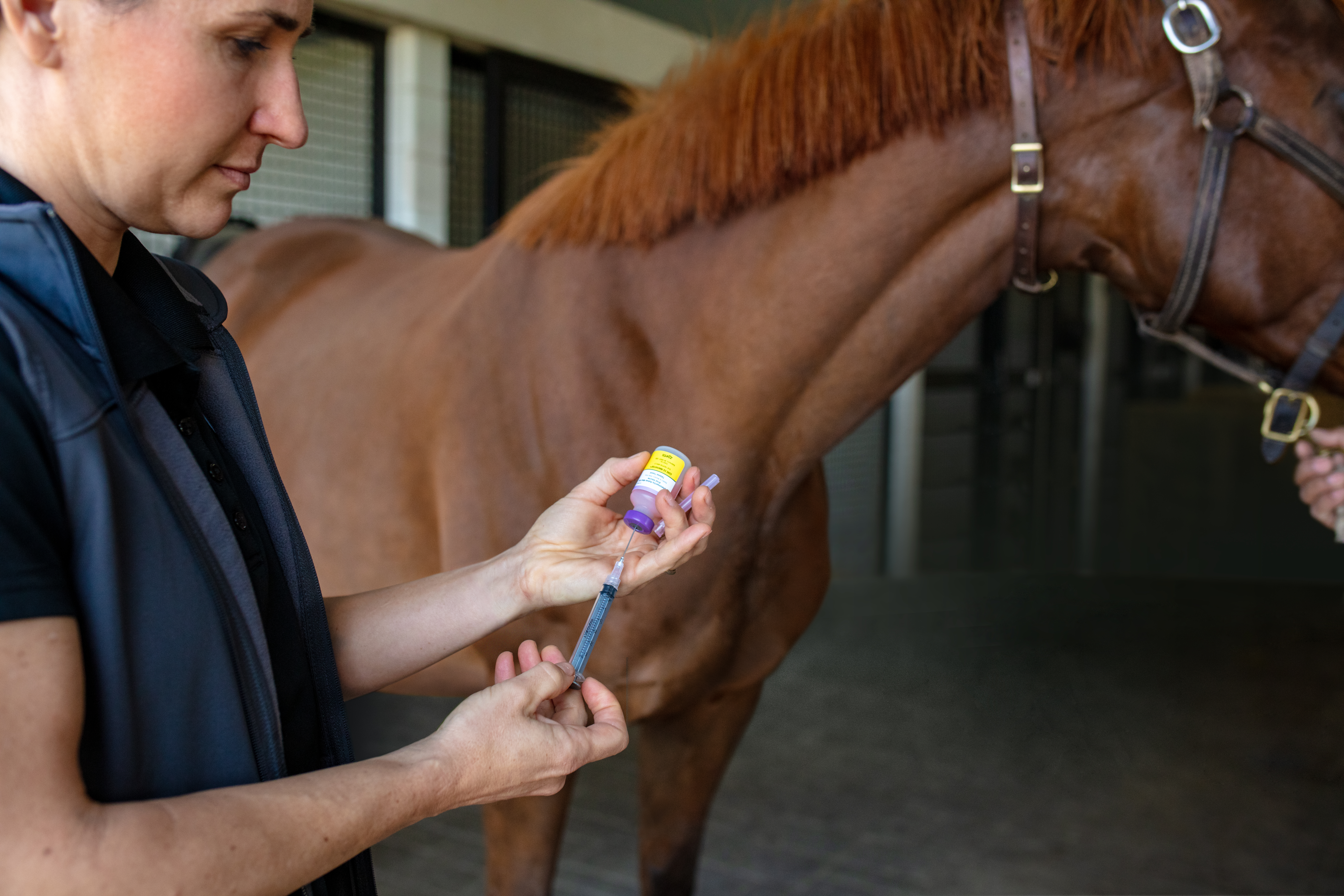
The importance of protecting against core diseases
It’s crucial to protect every horse from five core diseases annually. These diseases—West Nile virus, Eastern and Western equine encephalomyelitis (EEE, WEE), rabies, and tetanus—pose significant risks due to their widespread presence and potential fatality. But they’re easy to help prevent, since vaccines that protect against them are extremely effective.2
The carriers of these core diseases, such as mosquitoes, wildlife and soil bacteria, are commonly present in your horse’s regular surroundings. That's why the American Association of Equine Practitioners (AAEP) advises annual vaccinations, best given in spring before mosquitoes and wildlife are most active.2 Your veterinarian may also suggest specific risk-based vaccines based on your horse’s age, location and lifestyle.
West Nile Virus
33% fatal2
Eastern Equine Encephalomyelitis (EEE)
90% fatal2
Western Equine Encephalomyelitis (WEE)
50% fatal2
Rabies
100% fatal2
Tetanus
75% fatal3
The benefits of Core EQ Innovator®
Only Core EQ Innovator provides protection against all five core diseases in a single injection.1 Plus, research has shown that dividing core and risk-based vaccines into separate injections provided up to 4.7 times the immune response against equine influenza than a combination vaccine that included equine influenza protection.4

2 million doses sold since 20185

99.7% reaction-free in field safety studies6,7

Protection against all five core diseases in a single injection1
Safe to use for horses 3+ months old and for pregnant mares in their third trimester1
When should I vaccinate my horse?
Splitting core from risk-based vaccines allows you to work with your veterinarian to customize a vaccination program best-suited to protect your horse against the diseases most likely to be a threat to her. Learn more about vaccinating your horse for the most common risk-based diseases, equine influenza (flu) and herpesvirus (rhino), with Fluvac Innovator® EHV-4/1. Below is a vaccination schedule for protection from the core diseases and risk-based respiratory diseases aligns to the AAEP guidelines.2
In addition, other risk-based diseases may also pose a threat to your horse based on his unique needs and circumstances. Your veterinarian can provide guidance on which additional vaccines from the Zoetis portfolio may be appropriate for your horse’s vaccination schedule. See the vaccination guides below for adult horses, broodmares and foals for recommendations on what Zoetis vaccines may be appropriate for your horse’s unique needs.
What sets Zoetis Innovator vaccines apart?
MetaStim® Adjuvant
Only Zoetis Innovator vaccines are optimized with the MetaStim® adjuvant, designed to make presenting antigens into your horse’s immune system safe and effective, leading to an improved immune response.11,12
Microfiltered 5x
Zoetis Innovator vaccines are microfiltered five times to remove excess proteins that could lead to increased reactivity, resulting in greater antigen purity.
Zoetis Vaccine Support Program
When you protect your horse with Core EQ Innovator and Fluvac Innovator EHV-4/1 vaccines, you are also protected with one of the industry’s best equine immunization support guarantees. This reimburses up to $5,000 for documented diagnostic and treatment costs if a veterinarian properly administers one of these vaccines and the horse later contracts the corresponding disease. For complete details and requirements, see the Zoetis Equine Immunization Support Guarantee certificate.
We would love to hear your Core EQ Innovator success story
Core diseases and your horse's health
References
- Data on file. Study Report No. B951R-US-20-160, Zoetis Inc.
- American Association of Equine Practitioners. Vaccination Guidelines. https://aaep.org/guidelines/vaccination-guidelines. Accessed October 11, 2023.
- MacKay R. Tetanus. In: Sellon DC, Long M, eds. Equine Infectious Diseases, 2nd ed. St. Louis, MO: Saunders Elsevier, 2007:368-372.
- Data on file, Study Report No. 14OREQBIO-1, Zoetis Inc.
- Data on file, ZMR sales data for CORE EQ INNOVATOR® and CORE EQ INNOVATOR® + V. Zoetis Inc., 2018-2022.
- Data on file, Study Report No. B951R-US-14-056, Zoetis Inc.
- Data on file, Study Report No. B951R-US-16-106, Zoetis Inc.
- Ma X, Monroe BP, Cleaton JM, et al. Rabies Surveillance in the United States during 2016. J Am Vet Med Assoc. 2018;252(8):945-957.
- The American Society for the Prevention of Cruelty to Animals. Pet Statistics. https://www.aspca.org/helping-people-pets/shelter-intake-and-surrender/pet-statistics Accessed June 29, 2018.
- American Horse Council; Washington, D.C; 2017 Economic Impact of the U.S. Horse Industry.
- Davis EG, Zhang Y, Tuttle J, Hankins K, Wilkerson M. Investigation of antigen specific lymphocyte responses in healthy horses vaccinated with an inactivated West Nile virus vaccine. Vet Immunol Immunopathol. 2008;126(3-4):293-301.
- Horohov DW, Dunham J, Liu C, et al. Characterization of the in situ immunological responses to vaccine adjuvants. Vet Immunol Immunopathol. 2015;164(1-2):24-29.
- Animalytix Segment Data, Equine Vaccines, MAT June 2022 (accessed June 20, 2022).
- Epp T, Waldner C, Townsend HGG. A case-control study of factors associated with development of clinical disease due to West Nile virus, Saskatchewan 2003. Equine Vet J. 2007;39:498-503
- Bryans JT, Allen GP. Application of a chemically inactivated, adjuvanted vaccine to control abortigenic infection of mares by equine herpesvirus 1. Dev Biol Stand. 1982;52:493-498.
- Tengelsen LA, Yamini B, Mullaney TP, et al. A 12-year retrospective study of equine abortion in Michigan. J Vet Diagn Invest. 1997;9(3):303-306.
- Giles RC, Donahue JM, Hong CB, et al. Causes of abortion, stillbirth, and perinatal death in horses: 3,527 cases (1986-1991). J Am Vet Med Assoc. 1993;203(8):1170-1175.
- Hong CB, Donahue JM, Giles RC, et al. Equine abortion and stillbirth in central Kentucky during 1988 and 1989 foaling seasons. J Vet Diagn Invest. 1993;5(4):560-566.
 Visit veterinary professionals site
Visit veterinary professionals site

















